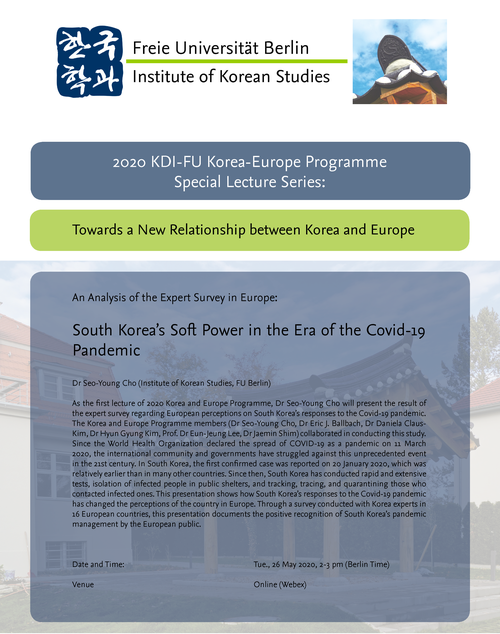2020 KDISchool-FU IKS Korea-Europe Programme Special Lecture Series
Towards a New Relationship between Korea and Europe
[26 May] South Korea's Soft Power in the Era of the Covid-19 Pandemic
Report:
On Tuesday, 27 May 2020, the Institute of Korean Studies at Freie Universität Berlin (FUIKS) hosted an online special lecture based on a recent expert survey it had conducted as a part of the KDISchool-FU’s Korea-Europe Programme. As European media outlets have recently spotlighted South Korea’s strong response to and rapid recovery from the pandemic, FUIKS published a working paper documenting how the picture of South Korea has changed in the eyes of the European public.
The presenter and one of the co-authors, Dr Seo-Young Cho, showed that South Korea’s countermeasures to the virus received a generally positive reception in Europe, while the public of some countries had reservations particularly about the applicability of South Korea’s tracking and tracing strategy to different legal-political, cultural or technical settings. Nonetheless, the majority of the respondents agreed that South Korea had improved its public perception in Europe by efficiently fighting back from the global crisis. With further studies and lectures to come, the Korea-Europe Programme aims to train young scholars and to enhance mutual regard between the regions.
[3 June] Dr. Eric J. Ballbach – "Unintended Consequences of the European Union's Sanctions Regime Against North Korea"
Report:
On Tuesday, 3 June 2020, Dr Eric J. Ballbach of the Institute of Korean Studies at Freie Universität Berlin (FU-IKS) shared his thoughts on the European Union’s sanctions regime against North Korea. The EU sanctions were first imposed in 2006, guided by UN resolutions and mostly with targeted measures against the individuals and entities responsible for North Korea’s first nuclear test. Departing from this initial approach, however, from 2016 and onwards, the EU had increasingly relied upon autonomous and comprehensive embargo.
Dr Ballbach warned that the recent non-discriminatory measures taken by the EU had produced several unintended and undesirable consequences. The current full-fledged sanctions regime was ineffective in promoting nonproliferation, human rights, or other major objectives. On the contrary, Dr Ballbach argued that the passive and reactive nature of the current approach had deprived European diplomats of strategic elbow room. Moreover, the all-encompassing embargo had taken its toll on the ordinary North Koreans who were already in short of food and medical products. With those strategic and humanitarian concerns in mind, the audience recognized the need to build greater awareness of this issue among European countries.
[16 June 2020] Dr. Jaemin Shim – "Public Perception at the Crossroads: COVID-19 and the Media Depiction of EU Countries in South Korea"
The Institute of Korean Studies at Freie Universität Berlin (FU-IKS) hosted the fourth special lecture of its Korea-Europe Programme, on June 16, 2020. Dr Jaemin Shim quantitatively analyzed how South Korea’s newspapers had depicted European countries hit by the novel coronavirus.
The 27 EU countries and the United Kingdom appeared on South Korean newspapers in the first quarter of 2020 twice as often as the same quarter of the past. Considerable attention was drawn particularly to the European countries’ struggle with the pandemic: e.g. the death toll, occurrence of racist attacks, (in)efficiency of the government countermeasures, degree of societal resilience, and other consequences. When Dr Shim examined 2,553 South Korean news articles and classified their attitudes, it was revealed that the once overwhelmingly positive sentiment toward European countries had undergone remarkable deterioration. Dr Shim’s analysis intriguingly complemented the Institute’s recent expert survey of how South Korea’s public image had improved in European countries during the same period.
After the lecture, Dr Shim discussed with the audience a variety of topics, including the perceived differences among European countries as well as how they were depicted vis-a-vis China by South Korean media.



